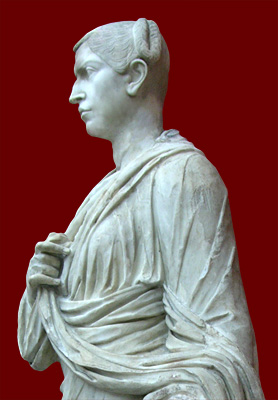
Statue of Fundilia, wealthy Roman matron
Sanctuary of Diana at Nemi, 1st century CE

Junia (73 BCE-22 CE), known in birth order as Junia Tertia and also as Tertula, was born into the gens Junia, a prominent political family that traced its ancestry to the first co-consul of the Republic, Lucius Junius Brutus, and was closely allied to Cato the Elder (see Family Tree), with ties to other leading plebeian conservatives. Her mother was Servilia Caepionis (c.104-after 42 BCE), daughter of Quintus Servilius Caepio and Livia Drusa. Livia Drusa's second husband was Marcus Porcius Cato, with whom she had a son, Marcus Porcius Cato Uticensis (95-46 BCE), Junia Tertia's maternal uncle. Servilia herself first married Marcus Junius Brutus, by whom she had a son, the tyrannicide Marcus Junius Brutus (June 85–23 October 42 BCE). Junia Tertia’s father, Servilia’s second husband, was Decimus Junius Silanus (consul 62 BCE), to whom Servilia bore three daughters, half-sisters of Brutus, all named Junia (see Names: citizen women). Cicero is reported to have remarked that Servilia, known to be Caesar's mistress, offered him access to her daughter in exchange for a favorable price on a property at public auction (Suetonius, Divus Julius 50; Macrobius, Saturnalia 2.2.5). By birth, marriage, and character Junia Tertia was invested in her family's Republican alliances, at first supporting and then opposing Caesar. The date of Junia's marriage to Gaius Cassius Longinus is unrecorded. Tertia bore Cassius a son, who assumed the toga virilis on the Ides of March, 44 BCE (Plutarch, Brutus 14.4), the day of the assasination of Julius Caesar; if, like Cicero and his son, the boy was 15 at his ceremony of puberty, then Junia gave birth to him when she was 13, in c. 60 BCE. On 8 June 44 BCE Junia, who had recently suffered a miscarriage (Cicero, Ad Atticum 14.20.2), attended a political meeting in Antium about Brutus' and Cassius' appointments, along with her mother Servilia, Brutus' wife Porcia, and anti-Caesarians including Cicero (see ad Atticum 15.11.1). Junia became a childless vidua (see McGinn) in 42 BCE at 31 years of age, when her husband Cassius committed suicide after the Republican defeat at Philippi. She remained an univira (see Vnivirae), dying 64 years later at the age of 95, in the reign of Tiberius (14-37 CE). Noting Junia Tertia's wealth, social status and connections, Tacitus remarks that Tiberius did not contest her will, although he was not named in it, and allowed her funeral to take place in the Roman Forum (ironically, Julia Marii was the first woman to receive this honor, in 69 BCE, at the request of her nephew Julius Caesar). In the passage below, Tacitus observes that death masks (imagines) of political leaders from many aristocratic Roman houses were carried in her funeral procession, though he names only two, the Manlii and Quinctii. For information on Roman death masks see Public Display: imagines and modern wax recreations; for history of the toga virilis; Polybius on elite Roman funerals; on Servilia and the elite women of the end of the final century of the Republic, see Treggiari (2019) in the Bibliography.
(1) Et Iunia sexagesimo quarto post Philippensem aciem anno supremum diem explevit, Catone
![]() avunculo genita, C. Cassii uxor, M. Bruti soror.
avunculo genita, C. Cassii uxor, M. Bruti soror.
(2) testamentum eius multo apud vulgum rumore fuit, quia in magnis opibus, cum ferme cunctos
![]() proceres cum honore nominavisset, Caesarem omisit.
proceres cum honore nominavisset, Caesarem omisit.
(3) quod civiliter acceptum, neque prohibuit quo minus laudatione pro rostris ceterisque sollemnibus funus cohonestaretur.
(4) viginti clarissimarum familiarum imagines antelatae sunt, Manlii, Quinctii aliaque eiusdem nobilitatis nomina.
(5) sed praefulgebant Cassius atque Brutus eo ipso quod effigies eorum non visebantur.
Click on the underlined words for translation aids and commentary, which will appear in a small window. Click on the icon link![]() to the right of the line for related images and information.
to the right of the line for related images and information.